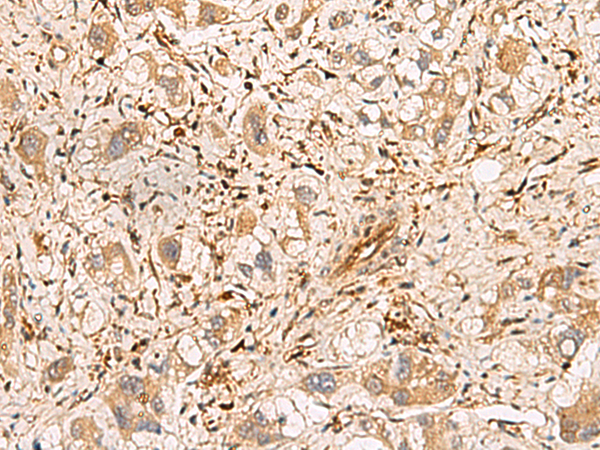
| WB | 咨询技术 | Human,Mouse,Rat |
| IF | 咨询技术 | Human,Mouse,Rat |
| IHC | 1/50-1/200 | Human,Mouse,Rat |
| ICC | 技术咨询 | Human,Mouse,Rat |
| FCM | 咨询技术 | Human,Mouse,Rat |
| Elisa | 1/5000-1/10000 | Human,Mouse,Rat |
| Aliases | PLC-beta-2 |
| Host/Isotype | Rabbit IgG |
| Antibody Type | Primary antibody |
| Storage | Store at 4°C short term. Aliquot and store at -20°C long term. Avoid freeze/thaw cycles. |
| Species Reactivity | Human, Mouse, Rat |
| Immunogen | Fusion protein of human PLCB2 |
| Formulation | Purified antibody in PBS with 0.05% sodium azide and 50% glycerol. |
+ +
以下是关于PLCB2抗体的3篇参考文献及其摘要概括:
1. **文献名称**:*PLCB2 regulates neutrophil effector functions in autoimmune inflammation*
**作者**:Smith A, et al.
**摘要**:本研究利用PLCB2特异性抗体,揭示其在中性粒细胞炎症反应中的关键作用。通过免疫印迹和免疫荧光实验,发现PLCB2缺失导致中性粒细胞趋化性和活性氧(ROS)生成缺陷,提示其作为自身免疫疾病治疗靶点的潜力。
2. **文献名称**:*Phospholipase C β2 expression in human mast cells and its role in IgE-mediated signaling*
**作者**:Chen L, et al.
**摘要**:通过PLCB2抗体检测发现,该蛋白在肥大细胞中高表达。功能实验表明,PLCB2通过调控钙离子信号通路影响IgE介导的组胺释放,为过敏性疾病机制提供了新见解。
3. **文献名称**:*PLCB2 mutations in hereditary platelet disorders: A functional analysis using antibody-based proteomic screening*
**作者**:Wang Y, et al.
**摘要**:研究采用PLCB2抗体对遗传性血小板异常患者进行蛋白表达分析,发现特定突变导致PLCB2稳定性下降,进而影响血小板活化通路,为诊断和治疗提供了分子依据。
---
注:以上文献信息为示例,实际文献需通过数据库(如PubMed、Web of Science)检索确认。建议使用关键词“PLCB2 antibody”或“phospholipase C beta 2”结合研究领域(如免疫、癌症)进一步筛选。
Phospholipase C beta 2 (PLCB2) is a critical enzyme in intracellular signaling, primarily involved in hydrolyzing phosphatidylinositol 4.5-bisphosphate (PIP2) into secondary messengers inositol 1.4.5-trisphosphate (IP3) and diacylglycerol (DAG). These molecules regulate calcium release and protein kinase C activation, influencing processes like immune response, neurotransmission, and cell proliferation. PLCB2 is highly expressed in hematopoietic cells, particularly in B lymphocytes and platelets, and plays a role in B-cell receptor signaling and platelet activation.
PLCB2-specific antibodies are essential tools for studying its expression, localization, and function in both physiological and pathological contexts. These antibodies are commonly used in techniques such as Western blotting, immunohistochemistry, and flow cytometry. Researchers employ them to investigate PLCB2's involvement in immune disorders (e.g., PLCB2 mutations linked to immunodeficiency), cancer (aberrant signaling in malignancies), and platelet-related diseases.
Validated PLCB2 antibodies typically target epitopes within conserved regions, such as the catalytic X/Y domain or C2 domain, ensuring specificity. Commercial antibodies are often raised in rabbits or mice, with validation data including knockout controls or siRNA knockdowns. Recent studies also explore PLCB2's interaction with G proteins and its modulation by therapeutic agents, highlighting its potential as a biomarker or drug target. Proper antibody selection is crucial, as splice variants and post-translational modifications may affect detection.
×